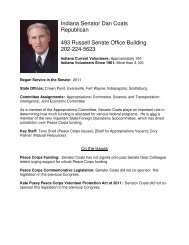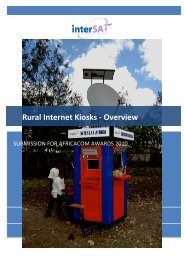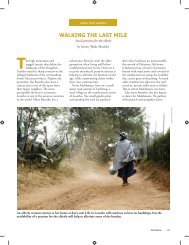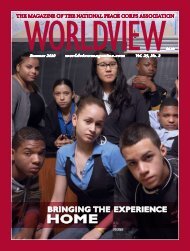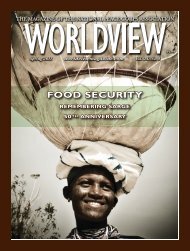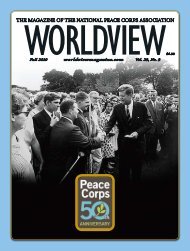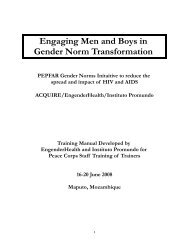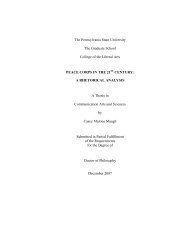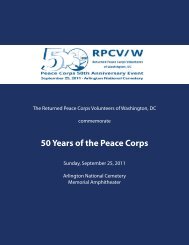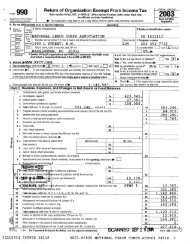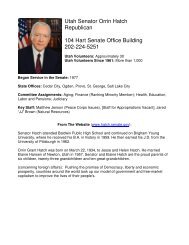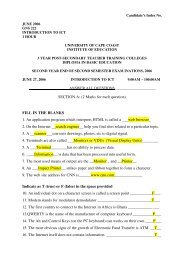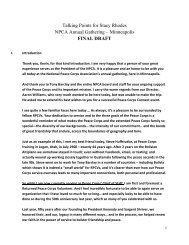Spring - National Peace Corps Association
Spring - National Peace Corps Association
Spring - National Peace Corps Association
You also want an ePaper? Increase the reach of your titles
YUMPU automatically turns print PDFs into web optimized ePapers that Google loves.
9-12 Corner: Diversity and Discrimination<br />
By Angene Wilson<br />
Anyone reading this newsletter probably agrees that the diversity of our nation and our world is a positive thing, but also realizes<br />
that discrimination occurs both in our country and around the world. The spring issue of WorldView magazine takes diversity as its<br />
theme. The articles offer an opportunity for teachers to engage students in learning about diversity and discrimination from a global<br />
perspective.<br />
I remember more than 25 years ago when I volunteered with an American youth exchange organization some American host families<br />
were surprised, even shocked, to discover that a German exchange student was black – had Ethiopian-German parents – and that a Dutch<br />
exchange student was brown – had Indonesian-Dutch parents. Of course, citizens of other countries have stereotypes of Americans as<br />
well. “You cannot be American,” a Chinese-American <strong>Peace</strong> <strong>Corps</strong> volunteer was told in Morocco. Serving while black in El Salvador<br />
was not easy for a <strong>Peace</strong> <strong>Corps</strong> volunteer. Navigating race in Benin was not easy for another African-American volunteer. An Indian-<br />
American volunteer was mistaken for a possible Pakistani spy in Ukraine. And how do gay volunteers deal with their identity overseas<br />
These are the topics of articles in the spring 2013 WorldView Magazine.<br />
The following lesson idea may fit in an English class in which writing a personal essay is a goal. A possibility in social studies,<br />
perhaps a psychology class, would be to use all the WorldView articles in the special section on diversity as resources.<br />
Objective:<br />
After reading the WorldView essay<br />
by Ravi Shah, write a two-page essay<br />
about an experience in which you or<br />
someone you know was discriminated<br />
against. Include the outcome of and<br />
reflections about the experience.<br />
Materials:<br />
WorldView article “Skin Deep” by<br />
Ravi Shah<br />
Procedure:<br />
Ask students to read Ravi Shah’s<br />
essay. In discussion of the essay, ask<br />
questions such as:<br />
• What is the challenge that is the<br />
focus of Ravi’s letter from the <strong>Peace</strong><br />
<strong>Corps</strong><br />
• How does Ravi begin to assuage his<br />
concerns<br />
• What are his other worries as a<br />
Californian moving to Ukraine<br />
• How did his Ukrainian host family<br />
make him feel welcome<br />
• What was his bad experience in the<br />
capital city of Kiev<br />
• What was the prejudice of his new<br />
host family at what was to be his<br />
permanent site<br />
• What was the happy ending<br />
• How and why might Ravi’s story<br />
have turned out differently<br />
Also discuss how Ravi puts together his<br />
essay to keep the reader interested as he<br />
describes the two instances of prejudice<br />
because of the color of his skin and the<br />
condition of his skin. Finally, ask students<br />
to write their own essay.<br />
Reminder to English<br />
Teachers:<br />
You will find wonderful essays and<br />
stories and lesson plans at peacecorps.<br />
gov in the publications Voices from the<br />
Field and Uncommon Journeys, available<br />
in pdf form. For example, the last<br />
of 11 essays in Uncommon Journeys is<br />
“Mr. John and the Day of Knowledge”<br />
about the first day of teaching English<br />
in Ukraine. Both publications aim to<br />
broaden students’ perspectives and<br />
inspire students to respond to the texts<br />
and create original narratives. Among<br />
my favorite essays in Voices from the<br />
Field – and I have even used these with<br />
undergraduate and graduate students<br />
-- are “Magic Pablo,” “Cross-Cultural<br />
Dialogue,” and “A Single Lucid Moment.”<br />
HREA Distance Learning Programme: Upcoming e-learning courses<br />
This a reminder about HREA’s e-learning courses offered in early 2013. These e-learning courses are generally six weeks in duration<br />
and involve approximately 30 hours of reading, interaction with participants and instructor(s) on discussion boards, webinars, quizzes<br />
and other assignments. Discounted tuition rates apply if you register and pay 4 or 8 weeks befor the course start. The following courses<br />
will be offered in April-May 2013:<br />
Gender-based Violence (3 April-14 May 2013)<br />
NEW! - La Programmation axée sur des droits de<br />
l’enfant (3 avril-18 juin 2013)<br />
Monitoring Children’s Rights (3 April-18 June<br />
2013)<br />
Forced Migration (10 April-21 May 2013)<br />
NEW! - Health and Human Rights (10 April-21<br />
May 2013)<br />
Human Rights, Sexual Orientation and Gender<br />
Identity (10 April-21 May 2013)<br />
NEW! - Monitoring & Evaluation in the NGO<br />
Sector (10 April-21 May 2013)<br />
Project Development and Management in the<br />
NGO Sector (10 April-4 June 2013)<br />
- Human Rights Advocacy (10 April-25 June<br />
2013)<br />
- Armed Conflict, Human Rights and Humanitarian<br />
Law (17 April-28 May 2013)<br />
- Genocide: What Role for International Law<br />
(17 April-28 May 2013)<br />
- Human Trafficking and Smuggling (17 April-28<br />
May 2013)<br />
NEW! - Monitoring Women’s Rights (17 April-28<br />
May 2013)<br />
For further information about each course please click on the course link above. Please note that we no longer have registration<br />
deadlines. Instead we offer early registration discounts up to 25% of the full tuition rate.<br />
For an overview of all courses, please visit www.hrea.org/courses.<br />
2 Global Education News, <strong>Spring</strong> 2013 www.peacecorpsconnect.org



